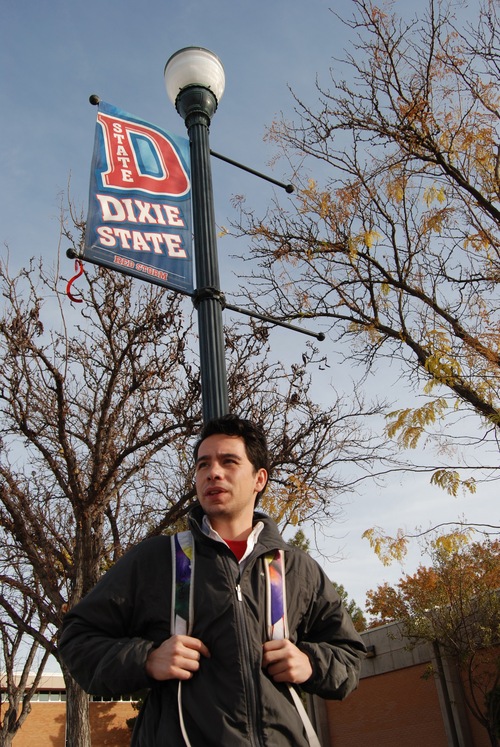This is an archived article that was published on sltrib.com in 2013, and information in the article may be outdated. It is provided only for personal research purposes and may not be reprinted.
St. George • Nearly 83 percent of people in and around Dixie State College supported retaining the school's name despite controversy over its connections to the Southern Confederacy, according to a study presented Wednesday.
"There is clearly a lot of passion around this issue," said Erik Sorenson, president of the advertising firm hired to for the study. He presented the results to a crowd of about 250 people who occasionally applauded and shouted during the hour-long event. Sparked by the college's impending move to university status, the study recommended the name overwhelmingly favored by the more-than 6,000 people surveyed or interviewed — Dixie State University.
The issue became fraught in recent weeks, pitting those who say the name is intended as a nod to the area's pioneer heritage against those who contend both the name and Southern regalia once used at the school has painful associations to the Deep South and slavery.
"Where I'm from, it's saying you oppress people. You condone racism," said senior Roi Wilkins. "If you're not straight, white and Latter-Day Saint, you're not welcome."
But for St. George Mayor Daniel McArthur, who exited the auditorium Wednesday singing a Dixie State song, the name is part of the area's identity.
"It makes us unique, sets us apart from any other place in the state," he said. The name traces back to a Church of Jesus Christ of Latter-day Saints mission to grow cotton in the 1800s, and the region is frequently called "Utah's Dixie" throughout the state. Some of the area's early settlers were former slave owners and slave drivers.
Though McArthur acknowledged that students performed in blackface in the 1960s, he said it shouldn't define the school. "There were minstrel shows everywhere. That was a different era."
Sorenson also acknowledged practical concerns about the name — since it seems to refer to another part of the country, academics who travel outside the area find people are confused about where the school is located. Some have told the Tribune they feel derided by outsiders for expressing disagreement about the name.
According to the study, faculty and staff were most supportive of a name change at 32 percent. In an perhaps-unexpected result, about 23 percent of St. George residents said Dixie should go, the second-highest percentage.
Of the students surveyed, 15.7 percent wanted to remove Dixie, and just 7.9 percent of alumni agreed.
Maureen Booth attended the school from 1965 to 1967.
"It's been here 100 years. It's a great name. Why change it?" she asked. Wilkins "won't be here in another three years. We will."
The school, however, could do a better job separating itself publicly from the "historical strife" associated with the word Dixie, which has been "tainted" by the years the college embraced Confederate regalia, Sorenson said. Officials ordered one of the last public symbols, a statue of a Confederate soldier, taken down last month.
But administrators could do more, said Dixie sophomore Jon Martin.
"Release an apology, an explanation. Say, 'This is why Dixie is important to us,'" he said.
Meanwhile, junior Taylor Nelson said that while he can understand the negative associations, the name is woven into the community both figuratively and literally — a white D is painted on the mountains above the town.
"I think we're letting [the controversy] define us as a school," Nelson said. "What should define a school is the students."
The $28,500 study was commissioned by Dixie State president Stephen Nadauld, who didn't attend Wednesday — he was in Washington state meeting with an accreditation committee, college spokesman Steve Johnson said.
The three-month process started in October. Between 250 and 500 people attended focus groups, public meetings and one-on-one interviews, while 5,000 to 6,000 people took an online survey that launched in November and closed Dec. 14.
Though no public comment was taken Wednesday, people can sound off on the name online at http://dixie.edu/namechange.
The Dixie State College Board of Trustees will vote on the name on Jan. 18, and the Utah Board of Regents will weigh whether to approve their decision on Jan. 25. —
Other names under consideration
University of St. George
Utah Dixie University
Utah Dixie State University



